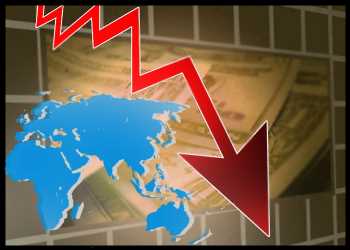Asian Markets Mostly Lower On Weak Wall Street Cues
Asian stock markets are trading mostly lower on Wednesday, following the broadly negative cues from Wall Street overnight, amid lingering concerns about the outlook for interest rates and the impact further rate hikes will have on the economy. Asian Markets closed mostly higher on Tuesday.
Stocks in the region have been under pressure since US Fed Chair Jerome Powell said last Friday that the central bank plans to continue aggressively raising interest rates to ensure inflation remains contained
Traders now look ahead to the US Labor Department’s more closely watched monthly jobs report on Friday for further cues on the outlook for interest rates.
The Australian stock market is slightly lower on Wednesday, giving up some of the gains in the previous session, with the benchmark S&P/ASX 200 staying below the 7,000 mark, following the broadly negative cues from Wall Street overnight, dragged by weakness in materials and energy stocks as crude oil and iron ore prices tumbled.
The benchmark S&P/ASX 200 Index is losing 8.60 points or 0.12 percent to 6,989.70, after hitting a low of 6,937.50 earlier. The broader All Ordinaries Index is down 4.20 points or 0.06 percent to 7,226.20. Australian stocks ended modestly higher on Tuesday.
Among major miners, BHP Group is losing 2.5 percent, Mineral Resources is declining almost 2 percent, Rio Tinto is down almost 1 percent and Fortescue Metals is slipping more than 3 percent, while OZ Minerals is flat.
Oil stocks are lower. Santos is losing more than 2 percent, Woodside Energy is declining almost 4 percent, while Beach energy and Origin Energy are slipping almost 2 percent each.
In the tech space, Xero and Appen are up more than 1 percent each, while Zip is gaining almost 5 percent and Afterpay owner Block is advancing more than 3 percent. WiseTech Global is losing almost 1 percent.
Among the big four banks, ANZ Banking is edging up 0.5 percent, National Australia Bank is gaining more than 1 percent and Westpac is adding almost 1 percent. Commonwealth Bank is flat.
Among gold miners, Resolute Mining, Gold Road Resources and Evolution Mining are flat, while Northern Star Resources and Newcrest Mining are edging down 0.1 to 0.4 percent each.
In economic news, private sector credit in Australia was up 0.7 percent on month in July, the Reserve Bank of Australia said on Wednesday, slowing from 0.9 percent in June. On a yearly basis, credit was up 9.1 percent – steady from the June reading.
Meanwhile, the Australian Bureau of Statistics said the total value of construction work done in Australia was down a seasonally adjusted 3.8 percent on quarter in the second quarter of 2022, coming in at A$52.073 billion. That missed expectations for an increase of 0.9 percent following the 0.9 percent decline in the previous three months. On a yearly basis, total construction done was down 4.3 percent.
In the currency market, the Aussie dollar is trading at $0.687 on Wednesday.
The Japanese stock market is modestly lower on Wednesday, giving up the gains in the previous session, with the Nikkei 225 staying a tad above the 28,000 mark, following the broadly negative cues from Wall Street overnight, dragged by energy stocks as crude oil prices tumbled, even as traders remain concerned over an economic slowdown and the outlook for interest rates.
The benchmark Nikkei 225 Index closed the morning session at 28,039.91, down 155.67 points or 0.55 percent, after hitting a low of 27,906.17 earlier. Japanese stocks closed significantly higher on Tuesday.
Market heavyweight SoftBank Group is edging up 0.4 percent, while Uniqlo operator Fast Retailing is losing more than 1 percent. Among automakers, Honda and Toyota are edging down 0.3 to 0.4 percent.
In the tech space, Screen Holdings and Advantest are losing almost 1 percent each, while Tokyo Electron is flat.
In the banking sector, Mizuho Financial is flat, while Mitsubishi UFJ Financial and Sumitomo Mitsui Financial are edging down 0.4 to 0.5 percent each.
Among the major exporters, Sony and Canon are losing almost 2 percent each, while Panasonic is edging up 0.4 percent. Mitsubishi Electric is flat.
Among the other major losers, Inpex is losing almost 4 percent, while Idemitsu Kosan, Pacific Metals and ENEOS Holdings are down almost 3 percent each.
Conversely, Kyocera is gaining almost 4 percent and Japan Steel Works is adding more than 3 percent.
In economic news, the value of retail sales in Japan was up 2.4 percent on year in July, the Ministry of Economy, Trade and Industry or METI said on Wednesday, coming in at 13.038 trillion yen. That beat forecasts for a gain of 1.9 percent following the 1.5 percent increase in June. On a monthly basis, retail sales rose 0.8 percent – in line with expectations following the upwardly revised 1.3 percent decline in the previous month (originally -1.4 percent).
The METI also said industrial output in Japan was up a seasonally adjusted 1.0 percent on month in July. That exceeded expectations for a decline of 0.5 percent following the upwardly revised 9.2 percent increase in June (originally 8.9 percent). On a yearly basis, industrial production sank 1.8 percent – roughly in line with expectations after slipping 2.8 percent in the previous month.
In the currency market, the U.S. dollar is trading in the mid-138 yen-range on Wednesday.
Elsewhere in Asia, China, Hong Kong and Indonesia are lower by between 1.0 and 1.3 percent each, while South Korea and Singapore are down 0.3 and 0.5 percent, respectively. New Zealand, Malaysia and Taiwan are higher by between 0.1 and 0.7 percent each.
On Wall Street, stocks showed another significant move to the downside during trading on Tuesday after extending last Friday’s sell-off to start the week. The major averages all moved notably lower, ending the session at their worst levels in a month.
The major averages climbed off their lows of the session in late-day trading but remained firmly negative. The Dow slumped 308.12 points or 1 percent to 31,790.87, the Nasdaq plunged 134.53 points or 1.1 percent to 11,883.14 and the S&P 500 tumbled 44.45 points or 1.1 percent to 3,986.16.
Meanwhile, the major European markets finished the day mixed. While the German DAX Index rose by 0.5 percent, the French CAC 40 Index edged down by 0.2 percent and the U.K.’s FTSE 100 Index slid by 0.9 percent.
Crude oil prices showed a substantial move to the downside during trading on Tuesday amid concerns higher interest rates will lead to a global economic slowdown, reducing energy demand. West Texas Intermediate crude for October delivery plunged $5.37 or 5 percent to $91.64 a barrel.
Source: Read Full Article


